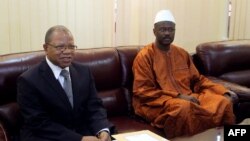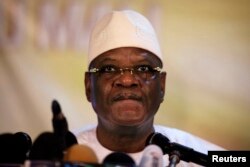DAKAR —
Mali's new president has named his prime minister, economist Oumar Tatam Ly. While some say a technocrat like Ly could be the fresh blood the country needs, others worry that his lack of government experience might be a problem.
Mali's new prime minister, Oumar Tatam Ly, was until recently an adviser to the governor of the Central Bank of West African States.
Ly is a relative political outsider. He doesn't officially belong to any political parties. His appointment as prime minister was greeted with surprise in Bamako. However, it could be seen as the follow-up to pledges by President Ibrahim Boubacar Keita that his government will pursue a new way of doing things for the country.
Keita says his government will steer clear of political horse trading and it will stamp out deeply entrenched corruption and improve state management.
The challenges are immense. Mali's economy is in shambles. The military needs an overhaul. Security remains a major problem. Legislative elections still need to be organized. And hundreds of thousands of northerners have not returned home after fleeing the chaos last year.
The international community has pledged billions of dollars in aid to rebuild the country, but it will up to this new government to set priorities and manage those funds.
This will be Ly's first government post. Analysts say that while his economic background could bode well for dealing with the challenges ahead, there is concern about his lack of experience navigating the tangled web of Malian politics.
"I'm not sure that he is very familiar with how the state actually functions," says Malian economist Younoussa Maiga. "The economy is just one part of what's at stake. There are also political and security challenges. Even when it comes to the economy, you need security in order to see positive results."
Mali is trying to come back from the events of 2012, when mutinous soldiers overthrew the government and al-Qaida-linked Islamist groups seized control of the northern two-thirds of the country.
Keita's election with 77 percent of the vote in a run-off last month was widely seen as a major step forward.
Amadou Maiga contributed reporting from Bamako, Mali.
Mali's new prime minister, Oumar Tatam Ly, was until recently an adviser to the governor of the Central Bank of West African States.
Ly is a relative political outsider. He doesn't officially belong to any political parties. His appointment as prime minister was greeted with surprise in Bamako. However, it could be seen as the follow-up to pledges by President Ibrahim Boubacar Keita that his government will pursue a new way of doing things for the country.
Keita says his government will steer clear of political horse trading and it will stamp out deeply entrenched corruption and improve state management.
The challenges are immense. Mali's economy is in shambles. The military needs an overhaul. Security remains a major problem. Legislative elections still need to be organized. And hundreds of thousands of northerners have not returned home after fleeing the chaos last year.
The international community has pledged billions of dollars in aid to rebuild the country, but it will up to this new government to set priorities and manage those funds.
This will be Ly's first government post. Analysts say that while his economic background could bode well for dealing with the challenges ahead, there is concern about his lack of experience navigating the tangled web of Malian politics.
"I'm not sure that he is very familiar with how the state actually functions," says Malian economist Younoussa Maiga. "The economy is just one part of what's at stake. There are also political and security challenges. Even when it comes to the economy, you need security in order to see positive results."
Mali is trying to come back from the events of 2012, when mutinous soldiers overthrew the government and al-Qaida-linked Islamist groups seized control of the northern two-thirds of the country.
Keita's election with 77 percent of the vote in a run-off last month was widely seen as a major step forward.
Amadou Maiga contributed reporting from Bamako, Mali.












